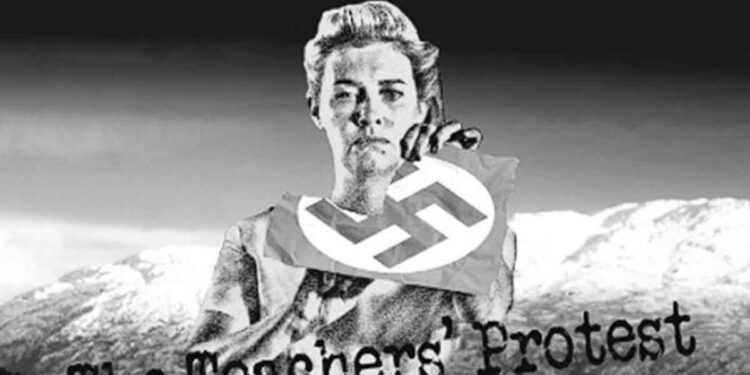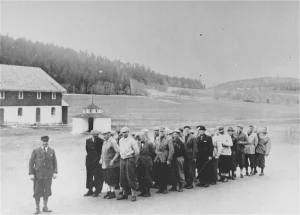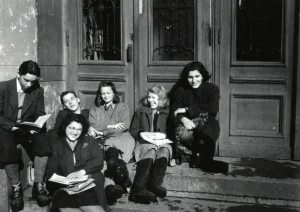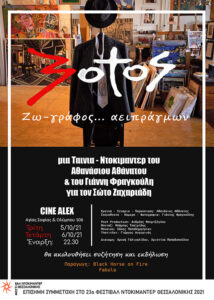THE TEACHERS’ PROTEST
Οκτ 24, 2024 Κινηματογράφος 0

MOVIE REVIEWS
THE TEACHERS’ RESISTANCE IN NORWAY
The teachers’ protest: Giannis Fragoulis writes
1942: Norway is under occupation. Teachers are obliged to join the Nazi Teachers’ Union and teach Nazi ideas in their classrooms. 8,000 of them write letters of protest. They are threatened with pay cuts, dismissal and forced labour. Yet they refuse. In a desperate attempt to “break them”, the Nazi government arrests 1,000 male teachers. They are sent to concentration camps 480 kilometres above the Arctic Circle. The education system is in chaos and now the great battle begins. Τhis is the summary of the film “The teachers’ protest”.
The teachers’ protest: The raw material
Herlov Åmland’s sketches were the first source of inspiration. Jon Seal directs this film which is in the realm of the dramatic documentary. Anime, fiction and documentary make a solid film that is the product of serious and detailed political analysis. The director knows that there is one fact: the resistance of the teachers is massive and comes in direct break with the Nazi government of Norway in 1940. The teachers make an adamant fight, at the risk of being imprisoned or, even, executed. They do not back down. The Nazi leader loses the battle. He admits that the teachers won and Norway did not become a Nazi state. When he finishes this speech to an audience, he leaves in tears.
The difficulty with this film is that it has a strong political event. For one country it is something that many generations will be proud of. A heroic act that, surely, has been written in indelible ink in the history of Norway. The Nazis wanted to own this country so they could enter Russia from another place. For the teachers’ union, worldwide, it is unthinkable. Education is not part of the primary sector and a strike didn’t matter much to the rulers. But this view is very shallow. As we shall see, education plays a huge role in raising awareness of reality and, consequently, in the resistance of the people.

The teachers’ protest: The rhythm
Can intellectuals rebel and change the political landscape? Antonio Gramsci says that an intellectual can only support the struggle of the revolutionary classes, he cannot alone make a revolution. The example of the Norwegian teachers overturns this theoretical version of the father of the communist Italian left. Nikos Poulantzas, in “The State, Power, Socialism”, identifies the three pillars of the state: the security forces, the church and education. He says that they are the three roads that lead to domination over the citizens by the governing system. Hitler knew full well that if he eroded education, then Nazism would dominate Norway. The teachers in this country believed the same. Their struggle was conscious and their strategy was well planned.
The film recreates these events, using the drawings that were found relating to this event. The rhythm created by the editing makes it easy for the viewer to synthesize their own point of view based on what the film offers. The linear narrative of the film, the juxtaposition of events, is interrupted by the visuals and the acting of the actors re-enacting the event. The frames, within the frame of the film, become the space where, many times, the representation exists, so we have one frame in another, in the frame, giving us the impression of cinema, voyeurism, according to several Seventh Art theorists.
The director knows very well that he must not falsify the historical event. He also knows that he must not let the fascination of this event carry him away and let his film narrative lose its power. He must keep a balance. Here is the difficulty in storytelling in this kind of cinema. In editing, he has to create the rhythm that keeps the viewer’s interest so that his film has artistic interest as well. He does all this successfully. That is why we can say that we have before us a masterpiece film.

The teachers’ protest: The present
The teachers’ battle is an example. The Nazi atrocity is a fact. Starting from these we can think about class struggles today. The political context may not be the same, but autocracy manifests itself in a different way from the state. The target again is education. If we form the consciousness of man, from primary education, then it is easy to make him a docile instrument in the ruling system, a cog in its machinery, those who design the architecture of the imperialist system are said to believe. And they are right.
We can, therefore, make our deductions in the present era. Let us see if the film is still relevant, its discourse meaningful and sharp in our times. Indeed, in our country we can see that it is in primary and secondary education that human consciousness is formed. We are witnessing chilling phenomena; in a number of schools there are active groups that are pro-right-wing, even in areas where small and medium-sized citizens, descendants of refugees, live. Fascism lurks in schools. Resistance must begin in the education system if we want to create people who will fight for freedom and equality between people.
The teachers’ protest: The fight
The floor now belongs to the teachers. They should understand that it is they who shape the consciousness of man. It is from the school, at all levels, that resistance to a system that wants to oppress the citizen, to place him or her in an environment of total control, to deprive him or her of the ability to refuse to follow practices that offend democracy and freedom and to assert his or her subordination, accepting this logic of the system as strong and non-negotiable, begins. It is a battle that can be won if teachers and parents are willing to ally themselves to create the yeast for a society governed by these values defined by humanism. This film is a good example in that direction.
THE TEACHERS’ PROTEST
Directed by Jon Seal
Written by Jon Seal
Research: Aase Andreassen
Music: Matthew Fullum
Sound: Ed Jobling
Production: Herlov Amland, Phillip Kingslan John, Jon Seal
Costumes: Flametorbay Costume Hire
Interviewers: Arne Amland, Herluf Aartun, Norunn Aartun Strand, Olav Aartun, Sigurd Aartun, Ingrid Eide, Kaare Kristensen, Mari Holmboe Ruge, Berit Hovig Hoigard, Robert Nesje, Kjell Arne Norum, Sigbjorn Sildnes
Actors: Phillip Kingslan John (Herlov Amland), Jack Pring (Neaar Sigurd), Ned Walker (Brynjulv), Charlie Coldfield (Olav Artun), Mills Simpson (Louise Artun), Olive Simpson (Olaug Aartun), Bea Simpson (Magnhild Aartun), Pete Cordwell (Regnar Skancke), Martin Hawker (Kare Norum), Sarah White (Lotte Holmboe), Robert Nesje (Haakon Holmboe), Matt Pullum (Reidar Klingberg), Nathan Simpson (Olav Eide), Sam Pike (Olav Hole), Oliver Copper (Erland), Elisabeth Bennet (Anna), Aidan Casey (Johan), Conor Magee (Kunze), Matt Lawrenson (Otto Vandvik), Jason Pring (train passenger), Kathy Towns (Mary Nilsen), Miall Yates (German officer), Poppy Watts (Emmy)
Produced by Jon Seal
Year of production: 2019
Country of production: Norway
Colour: colour and black and white
Genre: drama documentary
Duration: 77΄.
Σχετικά άρθρα
-
 ΕΠΙΣΤΡΟΦΗ ΣΤΗΝ...
ΕΠΙΣΤΡΟΦΗ ΣΤΗΝ...Μαρ 26, 2025 0
-

-

-
 GIANNIS IN THE CITIES
GIANNIS IN THE CITIESΜαρ 01, 2025 0
Στην ίδια κατηγορία
-
 ΤΑΙΝΙΕΣ ΑΠΟ ΤΙΣ...
ΤΑΙΝΙΕΣ ΑΠΟ ΤΙΣ...Απρ 03, 2025 0
-
 Ο ΓΥΡΟΣ ΤΟΥ ΚΟΣΜΟΥ...
Ο ΓΥΡΟΣ ΤΟΥ ΚΟΣΜΟΥ...Απρ 02, 2025 0
-
 ΜΙΑ ΓΥΝΑΙΚΑ...
ΜΙΑ ΓΥΝΑΙΚΑ...Μαρ 29, 2025 0
-
 ΦΕΣΤΙΒΑΛ ΓΑΛΛΟΦΩΝΟΥ...
ΦΕΣΤΙΒΑΛ ΓΑΛΛΟΦΩΝΟΥ...Μαρ 25, 2025 0
Αναζήτηση
-
 WONDER WOMAN
WONDER WOMANΙούν 09, 2017 138
-
 ΠΑΙΔΙΚΗ ΣΚΗΝΗ
ΠΑΙΔΙΚΗ ΣΚΗΝΗΟκτ 12, 2014 2
-
 ΚΛΗΡΩΣΗ ΠΡΟΣΚΛΗΣΕΩΝ
ΚΛΗΡΩΣΗ ΠΡΟΣΚΛΗΣΕΩΝΜαρ 22, 2014 2
-
 ΔΥΟ ΜΕΡΕΣ, ΜΙΑ ΝΥΧΤΑ
ΔΥΟ ΜΕΡΕΣ, ΜΙΑ ΝΥΧΤΑΝοέ 13, 2014 2
-
 ΑΧΙΛΛΕΑΣ ΨΑΛΤΟΠΟΥΛΟΣ
ΑΧΙΛΛΕΑΣ ΨΑΛΤΟΠΟΥΛΟΣΝοέ 09, 2014 2
-
 ISTABUL FILM FESTIVAL
ISTABUL FILM FESTIVALΜαρ 08, 2014 2
-
 ΤΑΙΝΙΕΣ ΑΠΟ ΤΙΣ ΤΑΙΝΙΟΘΗΚΕΣ
ΤΑΙΝΙΕΣ ΑΠΟ ΤΙΣ ΤΑΙΝΙΟΘΗΚΕΣΑπρ 03, 2025 0
-
 Ο ΓΥΡΟΣ ΤΟΥ ΚΟΣΜΟΥ ΤΟΥ ΜΙΚΡΟΥ ΓΚΡΙΖΛΙ
Ο ΓΥΡΟΣ ΤΟΥ ΚΟΣΜΟΥ ΤΟΥ ΜΙΚΡΟΥ ΓΚΡΙΖΛΙΑπρ 02, 2025 0
-
 ΗΛΙΟΣ ΜΕ ΔΟΝΤΙΑ
ΗΛΙΟΣ ΜΕ ΔΟΝΤΙΑΑπρ 02, 2025 0
-
 ΠΑΓΚΟΣΜΙΑ ΗΜΕΡΑ ΘΕΑΤΡΟΥ
ΠΑΓΚΟΣΜΙΑ ΗΜΕΡΑ ΘΕΑΤΡΟΥΜαρ 29, 2025 0
-
 ΜΙΑ ΓΥΝΑΙΚΑ ΕΞΟΜΟΛΟΓΕΙΤΑΙ
ΜΙΑ ΓΥΝΑΙΚΑ ΕΞΟΜΟΛΟΓΕΙΤΑΙΜαρ 29, 2025 0
-
 ΕΠΙΣΤΡΟΦΗ ΣΤΗΝ ΠΑΤΡΙΔΑ
ΕΠΙΣΤΡΟΦΗ ΣΤΗΝ ΠΑΤΡΙΔΑΜαρ 26, 2025 0

Δείτε το τρέιλερ της ταινίας μας, που συμμετέχει το Φεστιβάλ Ντοκιμαντέρ Θεσσαλονίκης.
SOTOS, EVERLASTING PAINTER (TRAILER)
Youtube
Επικοινωνήστε
ΓΙΑΝΝΗΣ ΦΡΑΓΚΟΥΛΗΣ
Email: info@filmandtheater.gr
Τηλ: (+30) 6974123481
Διεύθυνση: Ιωαννίνων 2, 56430, Σταυρούπολη Θεσσαλονίκη
![]()

